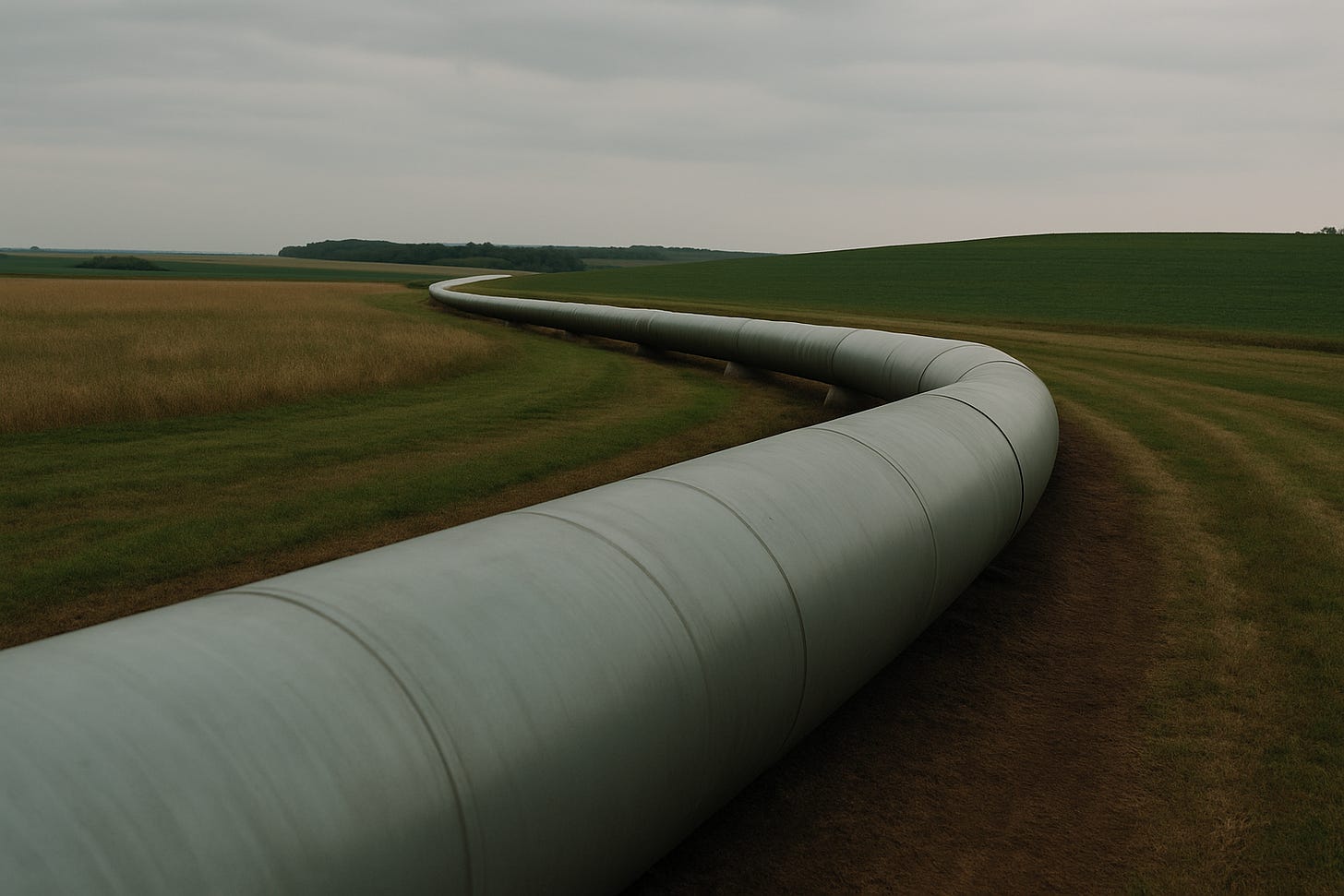The Pacing of Power: How Pipelines, RNG, and Geopolitics Are Redefining Energy Growth
From FERC’s cautious approval in Appalachia to a landfill-powered gas plant in New Jersey, this week’s energy stories all share one throughline: the infrastructure is expanding, but the confidence is tempered. Across every region — from the Delaware Basin to the Siberian frontier — developers, regulators, and governments are trying to reconcile ambition with necessity. What’s emerging is not a green revolution or a fossil renaissance, but a new era of strategic pacing.
🛤️ FERC Clears MVP Southgate — But Questions the Need
Source: Natural Gas Intelligence
The Federal Energy Regulatory Commission has cleared the Mountain Valley Pipeline’s Southgate Amendment on environmental grounds — but with a caveat that may reshape the project’s future. FERC’s environmental impact statement found no significant harm to air, water, or land resources, yet it raised doubts about whether the project is even necessary given the competing Williams Transco expansion already in the works.
The agency’s skepticism over “infrastructure overlap” points to a broader shift in regulatory thinking: just because a project is clean enough doesn’t mean it’s needed enough. Public comments will be open through early November, giving landowners, counties, and market analysts one last round to argue whether Southgate fills a gap — or duplicates one.
Crude Life Take:
This story captures the energy sector’s new friction point: the environmental box can be checked, but the economic justification remains the battleground. In a saturated midstream map, “redundant” projects are the next frontier of resistance — not necessarily environmental, but fiscal and territorial.
♻️ New Jersey RNG Facility Turns Trash into Transport Fuel
Source: Pipeline & Gas Journal
In Egg Harbor Township, OPAL Fuels and South Jersey Industries officially flipped the switch on a new renewable natural gas (RNG) facility converting landfill methane into clean-grade gas. The operation ties directly into the South Jersey Gas pipeline — a first for the company — and will process around 2,500 SCFM of landfill gas into 650,000 MMBtu of RNG annually.
The feedstock comes from the Atlantic County Utilities Authority landfill, turning what was once waste management into resource management. The partners claim the output equals displacing 4.6 million gallons of gasoline.
Crude Life Take:
RNG remains one of the most interesting bridges between hydrocarbons and renewables. It uses existing gas infrastructure, satisfies carbon-credit markets, and appeals to utilities hungry for local, measurable “green gas.”
Still, the economics are precarious — riding on subsidies, RIN markets, and policy stability. For now, this project marks progress, but the question is how many more can be built before the incentives shift.
🌍 Russia’s China Pipeline Deal — A Decade Away from Full Flow
Source: Caliber.az
Moscow and Beijing have signed a memorandum to move forward with the Power of Siberia 2 pipeline — a monumental project meant to replace the lost European gas market with new eastern exports. The pipeline could deliver 50 billion cubic meters annually via Mongolia, but even under ideal conditions, full output isn’t expected until 2034–2035.
Industry analysts say the timeline itself tells the story: Russia’s eastward pivot is real, but slow. Financing terms, pricing, and construction logistics remain open questions, giving China more leverage over every stage of the deal.
Crude Life Take:
For western energy markets, this is a geopolitical thermometer. Russia’s long-term shift to Asia may stabilize its gas exports eventually, but it won’t fix today’s fiscal holes.
For China, the delay is strategic — locking in supply without rushing dependency. For the rest of the world, it underscores that the global gas chessboard is in motion, but checkmate is years away.
🏗️ Cardinal Midstream Expands Delaware Basin Gathering & Processing
Source: Pipeline & Gas Journal
Cardinal Midstream continues to build its foothold in the Delaware Basin, expanding gathering and processing capacity in Reeves and Loving counties, Texas. The new buildout extends on Cardinal’s 2022 acquisition of Medallion Midstream assets, which included roughly 80 miles of pipe and a 140 MMcf/d processing plant.
By adding more gathering lines and compression, Cardinal is doubling down on basin density — a strategy that gives it operational leverage and better throughput economics amid rising associated gas volumes.
Crude Life Take:
Midstream growth in the Delaware is less about discovery and more about efficiency. The real competition isn’t between operators — it’s between molecules and margins. Whoever optimizes processing capacity and line integration wins the right to move the gas profitably, no matter what the commodity price does.
🧭 Closing Reflection: Infrastructure at a Crossroads
The four stories together illustrate an industry caught between expansion and restraint.
FERC is approving with hesitation.
RNG is expanding under subsidy stability.
Russia is building pipelines to hedge political isolation.
And U.S. midstream players are consolidating instead of exploring.
Energy infrastructure is no longer just a race to build — it’s a contest of timing, alignment, and justification. Whether it’s carbon credits, export routes, or basin capacity, the 2020s are proving that the next boom won’t be defined by drilling rigs or derricks, but by the deliberate architecture of connection.
Jason Spiess is an multi-award-winning journalist, entrepreneur, producer and content consultant. Spiess, who began working in the media at age 10, has over 35 years of media experience in broadcasting, journalism, reporting and principal ownership in media companies. Spiess is currently the host of several newsmagazine programs that air across a 22 radio stations and podcasts worldwide through podcast platforms, as well as a combined Substack and social media audience of over 500K followers. Connect with Spiess on LinkedIn
Everyday your story is being told by someone. Who is telling your story? Who are you telling your story to?
Email your sustainable story ideas, professional press releases or podcast submissions to thecontentcreationstudios(AT)gmail(DOT)com.




